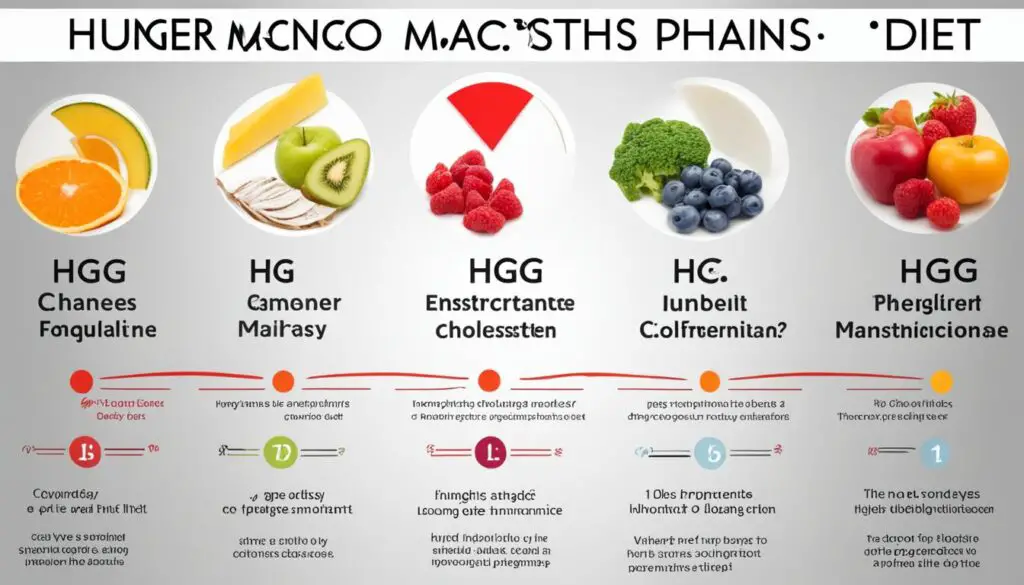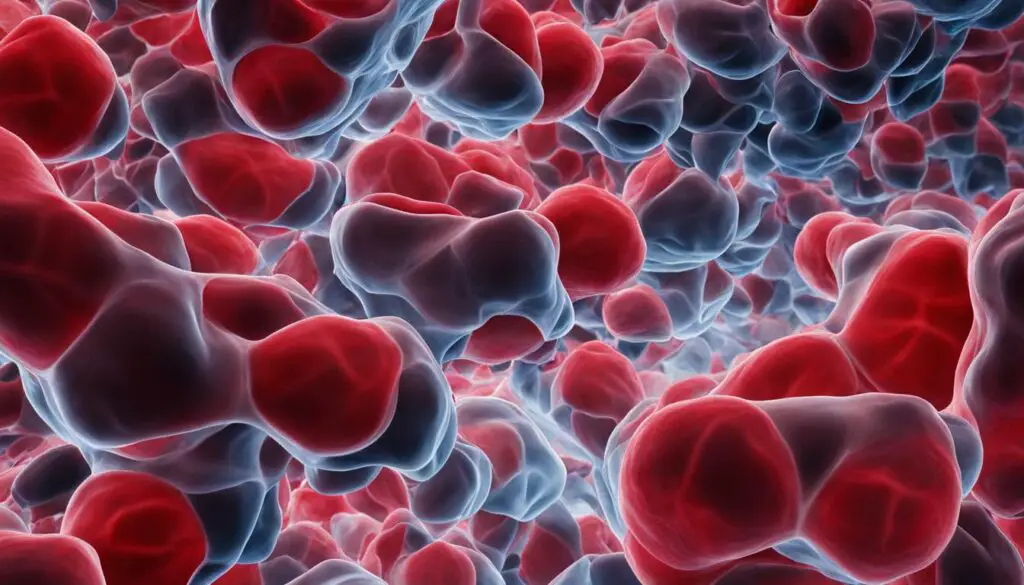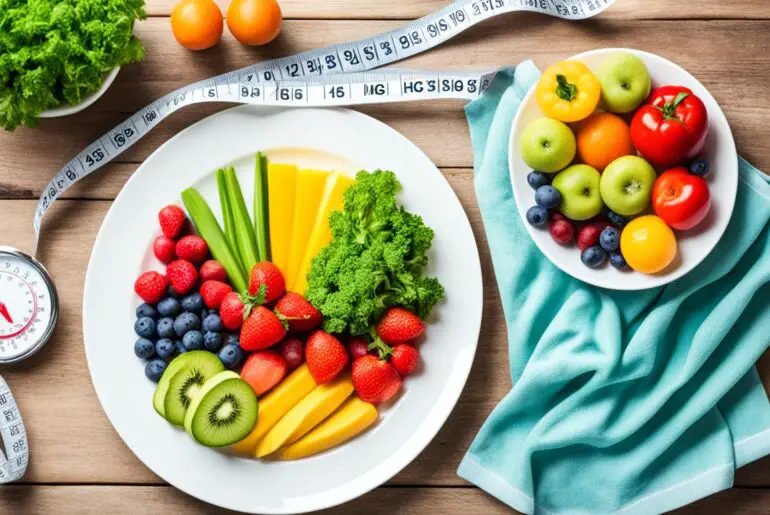Are you struggling to control your hunger while trying to lose weight? Look no further, because I have the solution for you. Introducing the HCG Diet and Hunger Management Plan – a revolutionary approach to weight loss that not only helps you shed those extra pounds but also provides effective hunger suppression and appetite control.
The HCG Diet combines the power of the HCG hormone with a strategic meal planning system to ensure sustainable weight management and rapid fat loss. Say goodbye to those pesky cravings and hello to a healthier, slimmer you.
Many diets claim to offer hunger suppression, but the HCG Diet takes it to a whole new level. By following this plan, you’ll not only lose weight but also experience a significant reduction in hunger and cravings.
Curious to know how the HCG Diet achieves such impressive results? Want to learn the science behind it and how it can transform your body? Keep reading to uncover the truth about hunger management on the HCG Diet and discover the strategies that will help you achieve your weight loss goals.
Managing Hunger on the HCG Diet
Hunger is a common challenge when following the HCG Diet. As the body adjusts to the reduced caloric intake, managing hunger becomes crucial for successful weight loss. Here are some essential hunger management tips to help you stay on track:
- Stay Hydrated: Drinking 2-4 liters of water per day is important for hunger control on the HCG Diet. Water helps promote feelings of fullness and can reduce cravings. Aim to stay well-hydrated throughout the day.
- Try Coffee and Green Tea: Coffee and green tea can help suppress appetite, making it easier to manage hunger. When consumed in moderation, these beverages can provide a temporary boost in energy while helping to control cravings.
- Space Out Meals: Spacing out meals throughout the day can help prevent excessive hunger. Instead of consuming all your calories in one or two large meals, try dividing them into smaller, more frequent portions. This can help keep hunger at bay and maintain stable energy levels.
- Include Adequate Protein: Protein is essential for satiety and can help keep you feeling fuller for longer. Make sure to include a good source of protein, such as lean meats, fish, tofu, or eggs, in each meal. This will help control hunger and preserve muscle mass during weight loss.
- Incorporate Free Vegetables: Free vegetables, such as lettuce, spinach, cucumbers, and celery, are low in calories and high in fiber. They provide bulk to your meals without adding many calories, helping you feel fuller on fewer calories. Include these vegetables in your meals to promote appetite suppression and manage hunger.
By implementing these hunger management tips, you can navigate the early stages of the HCG Diet more effectively and achieve your weight loss goals.
The Science behind the HCG Diet
The HCG hormone, or human chorionic gonadotropin, is naturally produced during pregnancy. In the case of the HCG Diet, the combination of the hormone and a very low-calorie intake is believed to promote rapid weight loss.
However, scientific studies have shown that the weight loss achieved on the HCG Diet is primarily due to the low-calorie intake rather than the hormone itself. The HCG hormone does not significantly reduce hunger.
To understand the science behind the HCG Diet, it’s important to recognize that the hormone is typically associated with pregnancy and its role in supporting fetal development. In pregnancy, HCG helps maintain the production of progesterone, a hormone crucial for sustaining pregnancy. The hormone is released by the placenta and increases significantly during the early stages of pregnancy.
“The weight loss achieved on the HCG Diet is primarily due to the low-calorie intake rather than the hormone itself.” – International Journal of Obesity
On the HCG Diet, individuals consume a very low-calorie diet, typically around 500 calories per day. This severe calorie restriction triggers the body to utilize stored fat as an energy source. The hormone is believed to aid in preventing muscle loss during this process. Proponents of the HCG Diet claim that the hormone accelerates metabolism and promotes fat burning, leading to rapid weight loss.
However, scientific research has debunked these claims. Studies have found that the weight loss achieved on the HCG Diet is primarily attributed to the calorie restriction rather than the hormone itself. The HCG hormone does not significantly impact metabolism or hunger reduction.
It’s important to note that the HCG Diet is a controversial approach to weight loss, and its safety and effectiveness are not widely supported by the medical community. While some individuals may experience short-term weight loss, it is often difficult to sustain in the long term due to the extreme calorie restriction.
Instead of relying on the HCG Diet, it is recommended to pursue a balanced and sustainable approach to weight loss that includes a nutritious diet, regular physical activity, and healthy lifestyle habits.
Understanding Body Composition on the HCG Diet
When following the HCG Diet, which involves severe calorie restriction, it is important to understand how it can impact your body composition. This section explores the effects of the diet on muscle mass, metabolic slowdown, fat loss, and muscle loss.
Severe Calorie Restriction and Muscle Mass:
One of the potential drawbacks of the HCG Diet is the risk of losing muscle mass. With a low-calorie intake, your body may enter a catabolic state, breaking down muscle tissue for energy. This can result in a loss of muscle mass, which can be detrimental to both your overall health and your long-term weight loss goals.
Metabolic Slowdown:
In addition to muscle loss, severely restricting calories can also lead to a metabolic slowdown. When your body senses a decrease in calorie intake, it enters a survival mode, conserving energy in order to sustain vital functions. As a result, your metabolism may slow down, making it more difficult to burn calories and lose weight.
Loss of Fat and Muscle:
Proponents of the HCG Diet claim that it promotes fat loss while preventing muscle loss. However, there is no scientific evidence to support these claims. In reality, when you restrict calories to such a significant extent, your body may tap into both fat stores and muscle tissue for energy. This can lead to a combination of fat and muscle loss, rather than targeted fat loss alone.
Long-Term Weight Loss:
It is important to recognize that low-calorie diets, such as the HCG Diet, are not effective for long-term weight loss. While you may experience rapid initial weight loss, much of it is likely to be water weight and muscle mass rather than sustainable fat loss. To achieve lasting results, it is crucial to focus on healthy, balanced eating habits and lifestyle changes.
To summarize, the HCG Diet’s severe calorie restriction can result in both muscle loss and metabolic slowdown. Claims of targeted fat loss and muscle preservation are not supported by scientific evidence. It is essential to approach weight loss with a sustainable and balanced approach that prioritizes long-term success.
The Rules of the HCG Diet

The HCG Diet is a structured program that consists of three phases: the loading phase, weight loss phase, and maintenance phase. Each phase has specific guidelines and objectives to support effective weight loss and long-term weight management.
Phase 1: Loading Phase
In the loading phase, individuals consume high-fat, high-calorie foods for two days while starting hCG hormone injections. This phase helps prepare the body for the calorie restriction that will follow and helps to replenish glycogen stores. During this phase, it is important to focus on calorie-dense foods, such as avocados, nuts, and oils, to provide the body with the necessary energy reserves.
Phase 2: Weight Loss Phase
The weight loss phase is the most crucial part of the HCG Diet. It involves consuming only 500 calories per day while continuing with the hormone injections. The purpose of this phase is to create a significant calorie deficit to promote rapid weight loss. Although the calorie restriction may seem extreme, the HCG hormone is believed to help alleviate hunger and maintain energy levels.
The meals during this phase should be carefully planned and composed of lean protein, vegetables, a small portion of bread, and a serving of fruit. It is essential to prioritize lean protein sources like chicken, fish, and tofu, as they are low in calories but provide essential nutrients and help preserve muscle mass.
Phase 3: Maintenance Phase
The maintenance phase is the final phase of the HCG Diet. It gradually increases food intake while avoiding sugar and starch for three weeks. The purpose of this phase is to stabilize weight loss, allow the body to adjust to increased calorie intake, and reset metabolism. It is crucial to reintroduce foods slowly and monitor portion sizes to prevent weight regain.
During the maintenance phase, it is important to focus on a balanced and nutritious diet that includes a variety of fruits, vegetables, lean proteins, whole grains, and healthy fats. This phase plays a vital role in establishing healthy eating habits and sustainable weight management.
Overall, the HCG Diet is a structured weight loss program that incorporates specific phases with varying calorie restrictions and meal compositions. It is important to adhere to the rules and guidelines of each phase to maximize weight loss and achieve long-term success.
| Phase | Objective | Key Guidelines |
|---|---|---|
| Loading Phase | Prepare the body for calorie restriction | Consume high-fat, high-calorie foods for two days Focus on calorie-dense foods like avocados and nuts Begin hCG hormone injections |
| Weight Loss Phase | Promote rapid weight loss | Limit caloric intake to 500 calories per day Continue hCG hormone injections Emphasize lean protein, vegetables, small portions of bread, and fruit |
| Maintenance Phase | Stabilize weight loss and reset metabolism | Gradually increase food intake Avoid sugar and starch for three weeks Focus on balanced and nutritious meals |
By following the rules and guidelines of each phase, individuals can effectively navigate the HCG Diet and achieve their weight loss goals. However, it is important to consult with a healthcare professional before starting any new diet or weight loss program to ensure safety and suitability.
Scam Products on the Market
When it comes to hCG products, it is essential to be aware of the presence of scam products in the market. Many of these products are labeled as homeopathic hCG, but they do not actually contain the hormone. Genuine hCG hormone injections can only be obtained with a prescription from a qualified healthcare professional.
The safety of hCG products, especially the over-the-counter (OTC) versions, has been questioned by the FDA. These products are unregulated, meaning they do not undergo the same rigorous testing and scrutiny as prescription medications. As a result, they may contain unknown ingredients and carry potential risks.
Reported side effects of hCG products include headaches, depression, and fatigue. It is important to note that these side effects may vary between individuals. If you experience any concerning symptoms while using hCG products, it is recommended to discontinue use and consult a healthcare provider.
| Key Points: | Scam Products on the Market |
|---|---|
| Product Labeling | Many hCG products labeled as homeopathic do not contain actual hCG hormone. |
| Prescription Requirement | Genuine hCG hormone injections can only be obtained with a prescription. |
| Safety Concerns | The FDA has expressed concerns about the safety of hCG products, especially OTC versions. |
| Unknown Ingredients | Unregulated hCG products may contain undisclosed and potentially harmful ingredients. |
| Reported Side Effects | Headaches, depression, and fatigue are among the reported side effects of hCG products. |
Safety and Side Effects of the HCG Diet

When it comes to the safety of the HCG diet, it’s important to consider the concerns raised by the FDA. The FDA does not approve HCG as a weight loss aid, and this raises questions about its safety and effectiveness. OTC HCG products, which are not regulated, may contain undisclosed ingredients that could pose risks to your health.
While following the HCG diet, it’s essential to be aware of the potential side effects. Common side effects associated with this diet include headaches, depression, and fatigue. It’s crucial to monitor your physical and mental well-being during this weight loss journey and seek medical advice if any undesirable effects persist.
In rare cases, blood clots have been reported in individuals following the HCG diet. This may be attributed to the low-calorie intake and hormonal changes caused by the diet. If you experience symptoms such as swelling, pain, or warmth in the legs, chest pain, or shortness of breath, it’s important to seek immediate medical attention, as these could be signs of a blood clot.
It’s essential to understand the risks and potential side effects associated with the HCG diet. Considering the FDA’s concerns and the reported side effects, it’s important to approach this diet with caution and under the guidance of a healthcare professional.
Other Ways to Control Hunger for Weight Loss
While following the HCG Diet, there are additional hunger control strategies that can aid in your weight loss journey. Incorporating these strategies can help you curb cravings, stay on track, and achieve your goals. Here are some effective methods to consider:
1. Regular Exercise
Exercise is not only beneficial for your overall health and fitness, but it can also help control hunger. Engaging in physical activity releases endorphins, which can reduce cravings and improve your mood. Aim for at least 30 minutes of moderate-intensity exercise, such as brisk walking or jogging, on most days of the week. Make exercise a regular part of your routine to maximize its hunger-curbing effects.
2. Hydration Is Key
Staying properly hydrated is essential for managing hunger. Sometimes, your body might mistake thirst for hunger, leading to unnecessary snacking. Make sure to drink an adequate amount of water throughout the day. Hydrating fluids like herbal tea or fruit-infused water are also great options. Aim for at least 8 cups of water daily to stay hydrated and keep hunger at bay.
3. Find Distractions
Redirecting your focus away from food can help control cravings. Engage in activities that grab your attention and keep your mind occupied. This could include watching a movie, reading a book, or pursuing a hobby. By finding enjoyable distractions, you can avoid mindless snacking and maintain control over your hunger.
4. Adopt a Healthy Mindset
Changing your mindset about food is crucial for long-term weight loss success. Instead of seeing food as an indulgence or a source of comfort, start viewing it as fuel for your body. Focus on consuming nutrient-dense, whole foods that provide sustenance and nourishment. Shift your mindset towards making mindful and healthier choices, which can help reduce unnecessary snacking and emotional eating.
By implementing these hunger control strategies alongside the HCG Diet, you can optimize your weight loss journey and achieve sustainable results. Remember, maintaining a positive mindset and adopting healthy habits are key factors in reaching your weight loss goals.
The key to successful weight management is adopting a sustainable and balanced approach to diet and lifestyle.
Exploring hCG for Weight Loss in NYC

HCG in NYC is a popular weight loss method that combines hCG hormone injections with a balanced diet to enhance metabolism and promote weight loss. While hCG injections can be effective, controlling calorie intake and making healthy eating choices are crucial components of the overall weight loss journey. Utilizing distractions, exercise, and a mindset shift can also aid in managing hunger while following the HCG Diet.
To get started on your weight loss journey with hCG in NYC, it is essential to consult with a healthcare professional who specializes in the HCG Diet. They will assess your health and provide personalized guidance to ensure safe and effective results.
Weight Loss Options in NYC
When considering weight loss options in NYC, hCG injections are a popular choice for those seeking rapid and significant results. These injections contain the hCG hormone, which is believed to stimulate metabolism and increase fat burning. The combination of hCG injections and a balanced diet can help individuals achieve their weight loss goals.
However, it is important to note that hCG injections should always be administered under the supervision of a qualified healthcare professional. They will guide you through the process and monitor your progress to ensure safety and effectiveness.
Metabolism and Weight Loss
A sluggish metabolism can often hinder weight loss efforts. By incorporating hCG injections into a weight loss plan, individuals in NYC can potentially boost their metabolism and increase their chances of successful weight loss. The hCG hormone is believed to promote the utilization of stored fat for energy, leading to a more efficient metabolism.
In addition to hCG injections, maintaining a balanced diet is essential for a healthy metabolism. Focus on consuming nutrient-dense foods, including lean proteins, fruits, vegetables, and whole grains. Avoid processed foods and excessive sugar intake, as they can negatively impact metabolism and weight loss progress.
Benefits of a Balanced Diet
When following hCG injections for weight loss in NYC, combining it with a balanced diet is key to achieving sustainable results. A balanced diet provides the necessary nutrients for overall health and well-being while supporting weight loss goals.
The key components of a balanced diet include:
- Lean proteins: such as chicken, fish, tofu, and legumes
- Fruits and vegetables: rich in vitamins, minerals, and fiber
- Whole grains: including quinoa, brown rice, and whole wheat bread
- Healthy fats: from sources like avocados, nuts, and olive oil
By incorporating these food groups into your daily meals, you can ensure a well-rounded and nutritionally dense diet that supports your weight loss efforts.
Remember, while hCG injections can be an effective tool for weight loss in NYC, they should always be used in conjunction with a balanced diet and under the supervision of a healthcare professional. By combining hCG injections, a balanced diet, exercise, and positive mindset, you can maximize your weight loss potential and achieve lasting results.
Conclusion
The HCG Diet and Hunger Management Plan offer a promising solution for weight loss. While managing hunger during the diet can be challenging, there are effective strategies to overcome this obstacle.
Staying hydrated by drinking plenty of water throughout the day is essential for hunger control. This not only helps curb your appetite but also supports overall well-being. Spacing out meals and consuming adequate protein can also keep hunger at bay and provide essential nutrients for your body.
Incorporating distractions into your daily routine can further aid in hunger management. Engaging in hobbies, exercising, or finding other activities that divert your attention from food can be beneficial. Remember, a balanced mindset and a sustainable approach to diet and lifestyle are essential for successful weight management.
FAQ
How can I manage hunger while following the HCG Diet?
To manage hunger on the HCG Diet, you can drink plenty of water, include coffee and green tea in moderation, space out meals, consume adequate protein, and incorporate free vegetables into your meals.
Why is hunger common in the early stages of the HCG Diet?
Hunger is common in the early stages of the HCG Diet as the body adjusts to the reduced caloric intake.
How can I stay hydrated while on the HCG Diet?
It is important to drink 2-4 liters of water per day to stay hydrated while on the HCG Diet.
Can coffee and green tea help suppress appetite on the HCG Diet?
Yes, coffee and green tea can help suppress appetite on the HCG Diet, but they should be consumed in moderation.
How can spacing out meals help manage hunger on the HCG Diet?
Spacing out meals can help manage hunger on the HCG Diet by preventing blood sugar spikes and crashes and promoting a more consistent release of energy.
Why is consuming adequate protein important on the HCG Diet?
Consuming adequate protein on the HCG Diet can help keep you feeling full and satisfied for longer.
How can incorporating free vegetables help suppress appetite on the HCG Diet?
Incorporating free vegetables into your meals can provide bulk and fiber, which can promote feelings of fullness and help suppress appetite on the HCG Diet.
Does the HCG hormone significantly reduce hunger on the HCG Diet?
No, scientific studies have shown that the weight loss achieved on the HCG Diet is primarily due to the low-calorie intake rather than the HCG hormone itself. The HCG hormone does not significantly reduce hunger.
Can the HCG Diet lead to a loss of muscle mass?
Yes, severe calorie restriction, such as that seen in the HCG Diet, can lead to a loss of muscle mass.
Does the HCG Diet cause a metabolic slowdown?
Yes, low-calorie diets, including the HCG Diet, may cause the body to conserve energy, resulting in a metabolic slowdown.
Can the HCG Diet promote fat loss and prevent muscle loss?
While proponents of the HCG Diet claim that it only promotes fat loss and prevents muscle loss, there is no scientific evidence to support these claims.
What are the phases of the HCG Diet?
The HCG Diet typically consists of three phases: the loading phase, weight loss phase, and maintenance phase.
What foods are allowed on the HCG Diet?
Meals on the HCG Diet generally include lean protein, vegetables, a small portion of bread, and a serving of fruit.
Are all hCG products labeled as homeopathic?
No, not all hCG products available on the market are labeled as homeopathic. Genuine hCG hormone injections can only be obtained with a prescription.
Are hCG products regulated by the FDA?
No, hCG products, especially over-the-counter versions, are not regulated by the FDA.
What are the reported side effects of hCG products?
Reported side effects of hCG products include headaches, depression, and fatigue.
Is the HCG Diet approved by the FDA?
The FDA does not approve hCG as a weight loss aid and has expressed concerns about the safety of the HCG Diet.
What are the side effects of the HCG Diet?
Side effects associated with the HCG Diet include headaches, depression, fatigue, and in rare cases, blood clots.
How can I control hunger and cravings for weight loss?
In addition to following the HCG Diet, you can control hunger and cravings for weight loss by engaging in regular exercise, staying hydrated, finding distractions, and adopting a mindset that views food as fuel rather than indulgence.
Is hCG for weight loss available in NYC?
Yes, hCG for weight loss is available in NYC. It is a popular weight loss method that combines hCG hormone injections with a balanced diet to enhance metabolism and promote weight loss.
What is the key to successful weight management?
The key to successful weight management is adopting a sustainable and balanced approach to diet and lifestyle.




